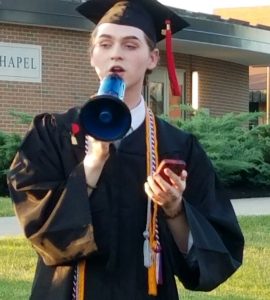There are more than 30 countries around the world that the UN considers “post-conflict.” This term means that in the past decades the country has experienced widespread violence, such as civil war or ethnic cleansing.
The road to peace for these countries, and their people, can be long and unfortunately punctured by new episodes of violence. The Contra War ended in Nicaragua in 1990, but despite this, since mid-April, Nicaragua has experienced political protests that have been violently repressed. Peaceful protesters have been met by violent counter-protests. The ensuing repressive police response has resulted in a fatality count nearing 100 people that grows by the day, according to human rights NGO’s.

A recent march for peace and justice in Managua, Nicaragua
Based on academic research, there is evidence that strong social connections and tourism both have a role to play in healing scars and maintaining peace in post-conflict countries around the world. In Rwanda, after the Tutsi genocide in 1994, the reconciliation government used tourism as a stabilizing economic force. Different ethnic groups were brought together to promote the country abroad, rebuild infrastructure, and maintain a welcoming and safe environment for foreign visitors.
Even more importantly, the ability to travel through a country and grow social connections between citizens of different, and formerly opposing groups, promotes dialogue, understanding, tolerance, and trust. Ghana suffered an ethnic conflict known as the Guinea Fowl War in 1994. After the conflict ended, the government made a concerted effort to promote social connections between the opposing groups in the conflict. This effort stirred dialogue between the opposing groups, and they were able to build mutual trust. In 1995 the opposing groups agreed to the Kumasi Draft Agreement on Peace and Reconciliation in the Northern Region of Ghana, and there have not been any major outbreaks of violence between the groups since then.
“The ability of political units to generate and sustain cooperation is part of what distinguishes successful states from those that fail, communities with high-levels of service provision from those that lack essential services, societies with well-functioning democratic institutions from those that underperform, and political groups that achieve power and influence from those that find themselves stuck on the sidelines.”
– Fearon, Humphrey, and Weinstein (2014)
Building long-lasting, strong, and resilient social connections requires travel. Citizens need to meet each other, talk to each other, learn from each other, and experience what life is like for other people. These are the keys to empathy which is the critical building block for understanding and co-existence. Transportation is essential to facilitate this process. The importance of transportation was noted during the peace efforts following the Guinea Fowl War, since it facilitated inter-personal exchanges between regions.
Unfortunately, many people in post-conflict countries around the world do not have easy access to transportation. While citizens may know when the buses come and go out of their cities and towns, making transfers and getting further afield is extremely difficult. Most countries do not have a website with consolidated bus timetables. Google Maps, for instance, does not operate in Nicaragua, rural Rwanda, or northern Ghana. This problem can even be exacerbated in post-conflict countries, where social connections have been severed between people from different groups and regions, so finding accurate transportation information for other regions is even more difficult.
 My company, ChickenBus, strives for a solution to this problem. We are collecting bus, ferry, and train timetables for the hardest to reach towns and villages of low and middle-income countries around the world. By making them available online we hope to make the healing process easier to bear for Nicaragua, Rwanda, Ghana, and other countries recovering from conflict. Hopefully, one day, ChickenBus can be used to promote peace in Syria, Yemen, South Sudan, and Myanmar as well. ChickenBus does not have to be confined to post-conflict healing. Around the world, we have a vision for students, travelers, and business people to use ChickenBus to seek education, meet new people, exchange ideas, and grow innovative businesses.
My company, ChickenBus, strives for a solution to this problem. We are collecting bus, ferry, and train timetables for the hardest to reach towns and villages of low and middle-income countries around the world. By making them available online we hope to make the healing process easier to bear for Nicaragua, Rwanda, Ghana, and other countries recovering from conflict. Hopefully, one day, ChickenBus can be used to promote peace in Syria, Yemen, South Sudan, and Myanmar as well. ChickenBus does not have to be confined to post-conflict healing. Around the world, we have a vision for students, travelers, and business people to use ChickenBus to seek education, meet new people, exchange ideas, and grow innovative businesses.

Research for this post was aided by Wonder, an online research company that delivers fast, reliable research reports.







